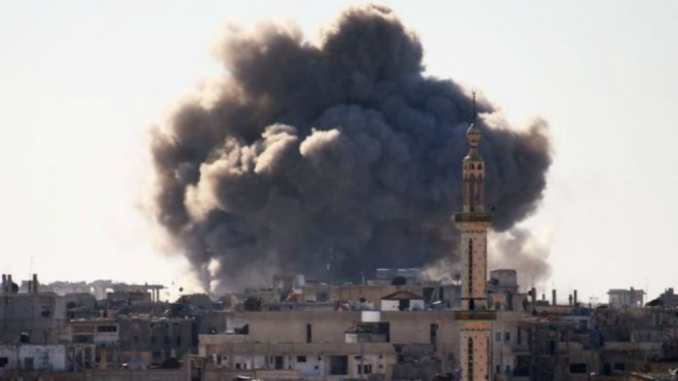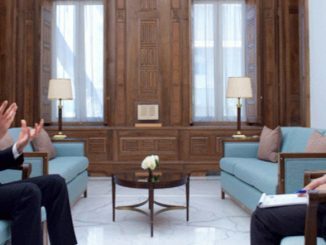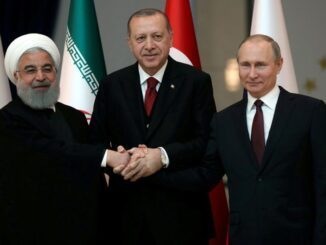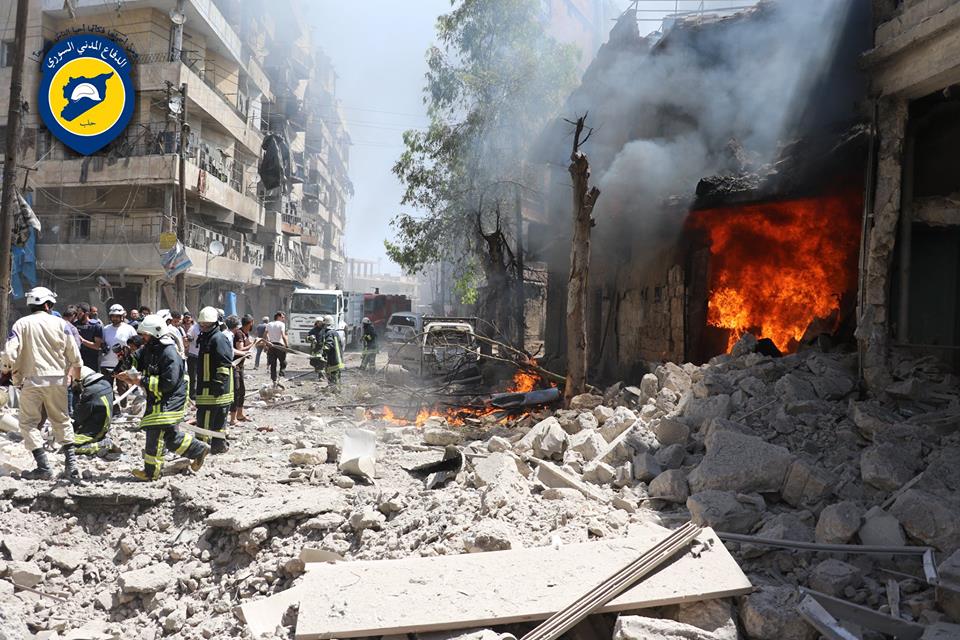
Syrian rebel groups and opposition figures said that the recent crimes committed by Assad regime against Syrian civilians were wrecking the prospects of maintaining a ceasefire and dooming the peace talks in Geneva to fail.
Russia, Iran, and Turkey said they were ready to help broker a Syria peace deal, and organized peace talks meeting in Kazakhstan on January 23.
The first day of the talks was focused on ways to strengthen the ceasefire. It ended with tension as both parts traded blames over truce breaches. In addition, the opposition refused to have direct negotiations with Assad regime.
The talks have ended with Russia, Turkey, and Iran making a joint statement about the consequences of the talks and agreeing on a mechanism to support a delicate ceasefire and to support a new round of peace talks in Geneva.
The second round of Astana talks was held in Kazakhstan’s capital on February 15-16. It didn’t have a final statement, but Turkey, Russia, and Iran issued a mutual agreement indicating that all sides have agreed “there is no military solution to the Syrian conflict and it can only be solved through the diplomatic implementation of U.N. Security Council Resolution Number 2254 in its entirety.”
The Syria peace talks had been planned to begin in Geneva on Feb. 8, but the UN envoy for Syria, Staffan de Mistura, said that he had decided to delay the UN-sponsored talks until February 23. in order to take advantage of the results of Astana talks.
However, the talks seem to be failing before they start as Assad regime kept breaching the so-called truce and killing more civilians.
We will go back to war if forced to
Assad regime forces bombarded several rebel-held areas in Homs, Damascus, and Deraa in the past days, in a clear breach of the Syria truce agreement.
At least 16 people were killed in shelling of an area near Damascus on Saturday, monitors and medical workers say.
Assad regime’s warplanes also bombarded the last rebel-held district of Homs, al-Waer, killing at least two people and raising the death toll from nearly two weeks of air strikes there to more than 30 including 10 children and 3 women, an activist and the Observatory said.
In addition, Assad regime’s and Russian warplanes stepped up their bombardment of rebel-held areas in the southern province of Deraa, carrying out at least 70 air strikes on Friday and Saturday, on Deraa city and towns to the east, the Observatory reported, while the city was declared as devastated city.
The groups operating as the Military Delegation of the Revolution said they reserved the right to respond to attacks which have mostly taken place in the south, in Homs and the outskirts of Damascus.
“What is happening … destroys prospects of a political solution and gives the revolutionary factions the right to an open response to every attack by the regime and its allies,” the group said in a statement.
The rebels describe the attacks as a “bloody message” from the Assad regime.
Mohammad Alloush, the head of the Astana talks delegation, said the rebel groups, who signed the shaky ceasefire deal late last year which was meant to end the bombing of civilians, were ready to go back to “all out war”.
“If you go back to war, we will (too), and if you go back to peace we will return (to peace),” Alloush told Reuters.
Doomed to failure
“A few days prior to the start of the round of talks of Geneva 4, the Assad regime and its allied militias began a military escalation violating all of the agreements and commitments made to the ceasefire declared on December 30, 2016, Wael Alwan, the opposition delegation media adviser to Geneva said in.
“The Assad-besieged Waer neighborhood in Homs suffered from several air raids, in addition to heavy artillery shelling, ground missiles and sniping operations which caused dozens of civilians to fall victim to this military escalation, including children, Alwan said.
“The military buildup also continued on the Qaboun neighborhood in Damascus, launching a number of airstrikes and artillery fire and leaving a large number of civilians dead or wounded. The artillery shells and rockets also targeted a funeral which lead to an appalling massacre in the Afja neighborhood of Damascus, killing more than 13 mourning civilians.
“The heavy shelling also continued on the fronts of eastern Ghouta in Damascus, particularly on the city of Harasta, as well as the towns of Daraa, Hama, Idlib and Aleppo countryside.
“This military escalation and these flagrant violations come at a time between the meetings of Astana and Geneva 4 scheduled on February 23. This proves that Russia seeks to keep its commitments loyal to Assad and his allies regarding a military solution and the pre-empting of all the political means that the revolutionary forces and the opposition wish to achieve to alleviate the suffering of the Syrian people and end the bloodshed all across Syria.
“With the absence of a real guarantor to achieve an actual ceasefire and a solid international stance – that is lost between the new US administration and Geneva 4, which is doomed to failure – the great responsibility falls on the shoulders of the international community to achieve a favorable climate for the start of negotiations and the political transition process, which cannot begin to bear fruit and the desired stability without real commitment and seriousness in achieving the ceasefire,” Alwan concluded.
The Syrian crisis began as a peaceful demonstration against the injustice in Syria. Assad regime used to fire power and violence against the civilians and led to armed resistance. 450.000 Syrians lost their lives in the past five years according to UN estimates, and more than 12 million have lost their homes.



